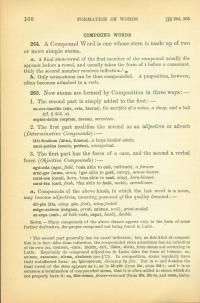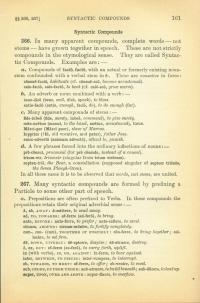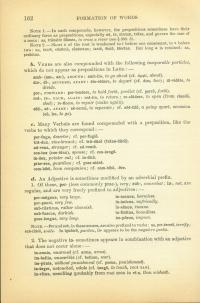264. A compound word is one whose stem is made up of two or more simple stems.
a. A final stem vowel of the first member of the compound usually disappears before a vowel, and usually takes the form of i before a consonant. Only the second member receives inflection.1
b. Only noun stems can be thus compounded. A preposition, however, often becomes attached to a verb.
265. New stems are formed by Composition in three ways:
- The second part is simply added to the first.
su-ove-taurīlia the sacrifice of a swine, a sheep, and a bull
(sūs, ovis, taurus) (cf. § 255.a)septen-decim seventeen
(septem, decem) - The first part modifies the second as an adjective or adverb (Determinative Compounds).
lāti-fundium a large landed estate
(lātus, fundus)omni-potēns omnipotent
(omnis, potēns) - The first part has the force of a case, and the second a verbal force (Objective Compounds).
agri-cola a farmer
(ager field, †cola akin to colō cultivate)armi-ger armor-bearer
(arma arms, †ger akin to gerō carry)corni-cen horn-blower
(cornū horn, †cen akin to canō sing)carni-fex executioner
(carō flesh, †fex akin to faciō make)
a. Compounds of the above kinds, in which the last word is a noun, may become adjectives, meaning possessed of the quality denoted.
āli-pēs wing-footed
(āla wing, pēs foot)
māgn-animus great-souled
(māgnus great, animus soul)
an-ceps double
(amb- at both ends, caput head)
Note— Many compounds of the above classes appear only in the form of some further derivative, the proper compound not being found in Latin.
Syntactic Compounds
266. In many apparent compounds, complete words—not stems—have grown together in speech. These are not strictly compounds in the etymological sense. They are called Syntactic Compounds.
a. Compounds of faciō, factō, with an actual or formerly existing noun stem confounded with a verbal stem in ē-. These are causative in force.
cōnsuē-faciō habituate
(cf. cōnsuē-scō become accustomed)
cale-faciō, cale-factō to heat
(cf. calē-scō grow warm)
b. An adverb or noun combined with a verb.
bene-dīcō to bless
(bene well, dīcō speak)
satis-faciō to do enough (for)
(satis enough, faciō do)
c. Many apparent compounds of stems.
fide-iubeō to give surety
(fide surety, iubeō command)
mān-suētus tame
(manuī to the hand, suētus accustomed)
Mārci-por slave of Marcus
(Mārcī puer)
Iuppiter father Jove
(†Iū, old vocative, and pater)
anim-advertō attend to, punish
(animum advertō)
d. A few phrases forced into the ordinary inflections of nouns.
prō-cōnsul proconsul
(for prō cōnsule instead of a consul)
trium-vir triumvir
(singular from trium virōrum)
septen-triō the Bear, a constellation
(supposed singular of septem triōnēs the Seven Plough-Oxen)
In all these cases it is to be observed that words, not stems, are united.
267. Many syntactic compounds are formed by prefixing a Particle to some other part of speech.
a. Prepositions are often prefixed to Verbs. In these compounds the prepositions retain their original adverbial sense.
ā, ab AWAY:
ā-mittere to send away
ad TO, TOWARDS:
af-ferre (ad-ferō) to bring
ante BEFORE:
ante-ferre to prefer
ante-cellere to excel
circum AROUND:
circum-mūnīre to fortify completely
com-, con- (cum) TOGETHER or FORCIBLY:
cōn-ferre to bring together
collocāre to set firm
dē DOWN, UTTERLY:
dē-spicere despise
dē-struere destroy
ē, ex OUT:
ef-ferre (ec-ferō) to carry forth, uplift
in (with verbs) IN, ON, AGAINST:
īn-ferre to bear against
inter BETWEEN, TO PIECES:
inter-rumpere to interrupt
ob TOWARDS, TO MEET:
of-ferre to offer
ob-venīre to meet
sub UNDER, UP FROM UNDER:
sub-struere to build beneath
sub-dūcere to lead up
super UPON, OVER AND ABOVE:
super-fluere to overflow
Note 1— In such compounds, however, the prepositions sometimes have their ordinary force as prepositions, especially ad, in, circum, trāns, and govern the case of a noun.
trānsīre flūmen to cross a river (see § 388.b).
Note 2— Short a of the root is weakened to i before one consonant, to e before two.
faciō, cōnficiō, cōnfectus
iaciō, ēiciō, ēiectus
But long a is retained.
perāctus
b. VERBS are also compounded with the following inseparable particles, which do not appear as prepositions in Latin.
amb- (am-, an-) AROUND:
amb-īre to go about (cf. ἀμφί about)
dis-, dī- ASUNDER, APART:
dis-cēdere to depart (cf. duo two)
dī-vidĕre to divide
por- FORWARD:
por-tendere to hold forth, predict (cf. porrō forth)
red-, re- BACK, AGAIN:
red-īre to return
re-clūdere to open (from claudō shut)
re-ficere to repair (make again)
sēd-, sē- APART:
sē-cernō to separate
[cf. sēd-itiō a going apart, secession (eō, īre to go)]
c. Many Verbals are found compounded with a preposition, like the verbs to which they correspond.
per-fuga deserter
cf. per-fugiō
trā-dux vine-branch
cf. trā-dūcō (trāns-dūcō)
ad-vena stranger
cf. ad-veniō
con-iux (con-iūnx) spouse
cf. con-iungō
in-dex pointer out
cf. in-dīcō
prae-ses guardian
cf. prae-sideō
com-bibō boon companion
cf. com-bibō, -ĕre
d. An Adjective is sometimes modified by an adverbial prefix.
1. Of these, per- (less commonly prae-) very; sub- somewhat; in- not, are regular, and are very freely prefixed to adjectives.
| per-māgnus very large | in-nocuus harmless |
| per-paucī very few | in-imīcus unfriendly |
| sub-rūsticus rather clownish | īn-sānus insane |
| sub-fuscus darkish | īn-fīnītus boundless |
| prae-longus very long | im-pūrus impure |
Note— Per and sub, in these senses, are also prefixed to verbs.
per-terreō terrify
sub-rīdeō smile
In īgnōscō pardon, in- appears to be the negative prefix.
2. The negative in- sometimes appears in combination with an adjective that does not occur alone.
in-ermis unarmed (cf. arma arms)
im-bellis unwarlike (cf. bellum war)
im-pūnis without punishment (cf. poena punishment)
in-teger untouched, whole (cf. tangō to touch, root TAG)
in-vītus unwilling (probably from root seen in vī-s thou wishest)
Footnotes
-dicis), from stems not occurring in Latin. Especially do compound adjectives in Latin take the form of i-stems.
animus , exanimis
nōrma, abnōrmis (see § 73)
In composition, stems regularly have their uninflected form:
īgni-spicium divining by fire
but, in o- and ā- stems the final vowel of the stem appears as i-.
āli-pēs (from āla, stem ālā-)
i- is so common a termination of compounded stems, that it is often added to stems which do not properly have it.
flōri-comus flower-crowned
(from flōs, flōr-is, and coma hair)



